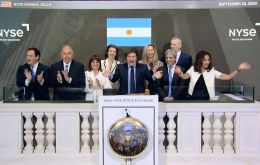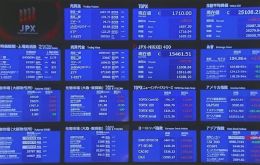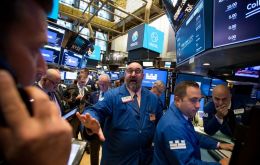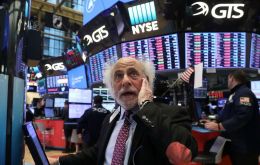MercoPress. South Atlantic News Agency
Tag: NYSE
-
Tuesday, September 24th 2024 - 10:11 UTC
Argentina's bonds slump after Milei's NYSE speech

Argentine bonds on Wall Street fell up to 3.6% on average Monday after President Javier Milei's speech before the New York Stock Exchange (NYSE), during which he announced that his government would release the currency exchange rate controls once zero percent inflation is achieved. During his speech on Monday, Milei also rang the traditional bell that starts stock market operations.
-
Monday, August 5th 2024 - 21:36 UTC
“Black Monday” hits stock exchange markets worldwide

Plunging Asian stock markets set off a domino effect “Black Monday” on Aug. 5. For Japan's Nikkei, a 12.4% drop was its second-deepest ever. As a result, fears of a recession in the United States have mounted following last week's global falls.
-
Friday, October 12th 2018 - 08:54 UTC
Volatile session in US markets with indexes continuing the several sessions slide

Wall Street indexes continued their slide in Thursday’s volatile session as investors worried about rising interest rates and braced for a trade war hit to corporate earnings a day ahead of the quarterly reporting season kickoff.
-
Thursday, October 11th 2018 - 09:08 UTC
US markets suffer their sharpest one-day fall: fears of interest rates, inflation and trade tensions

United States share markets suffered on Wednesday their sharpest one-day falls in months, as fears about rising interest rates, inflation, trade tensions intensified. The tech-heavy Nasdaq led the declines, sliding 4%, or 315.9 points, to 7,422. The Dow Jones and S&P 500 also fell by more than 3%, with losses accelerating towards the end of the day. Netflix fell 8%, while Amazon slid 6%.
-
Friday, February 9th 2018 - 09:56 UTC
As Dow Jones plunges 10% points, fears of a bear market and ripples effects on the economy

The United States Dow Jones industrial average nosedived more than 1,000 points on Thursday, registering another eye-popping loss for the closely-followed index, as wild trading and fears of rising interest rates around the world took hold of traders. The Dow as well as the S&P 500, a broader stock index, are now down more than 10% from their all-time highs, passing an important psychological barrier known as a “correction” for the first time in two years.
-
Wednesday, February 7th 2018 - 08:44 UTC
Algorithmic trading accelerated Black Monday markets plunge, speculate analysts

Robot trading has accelerated this week's market dive and may have sparked the sell-off, experts say. Financial firms use computers programmed with complex sets of instructions known as algorithms, which identify trading opportunities and then strike faster than any human could.
